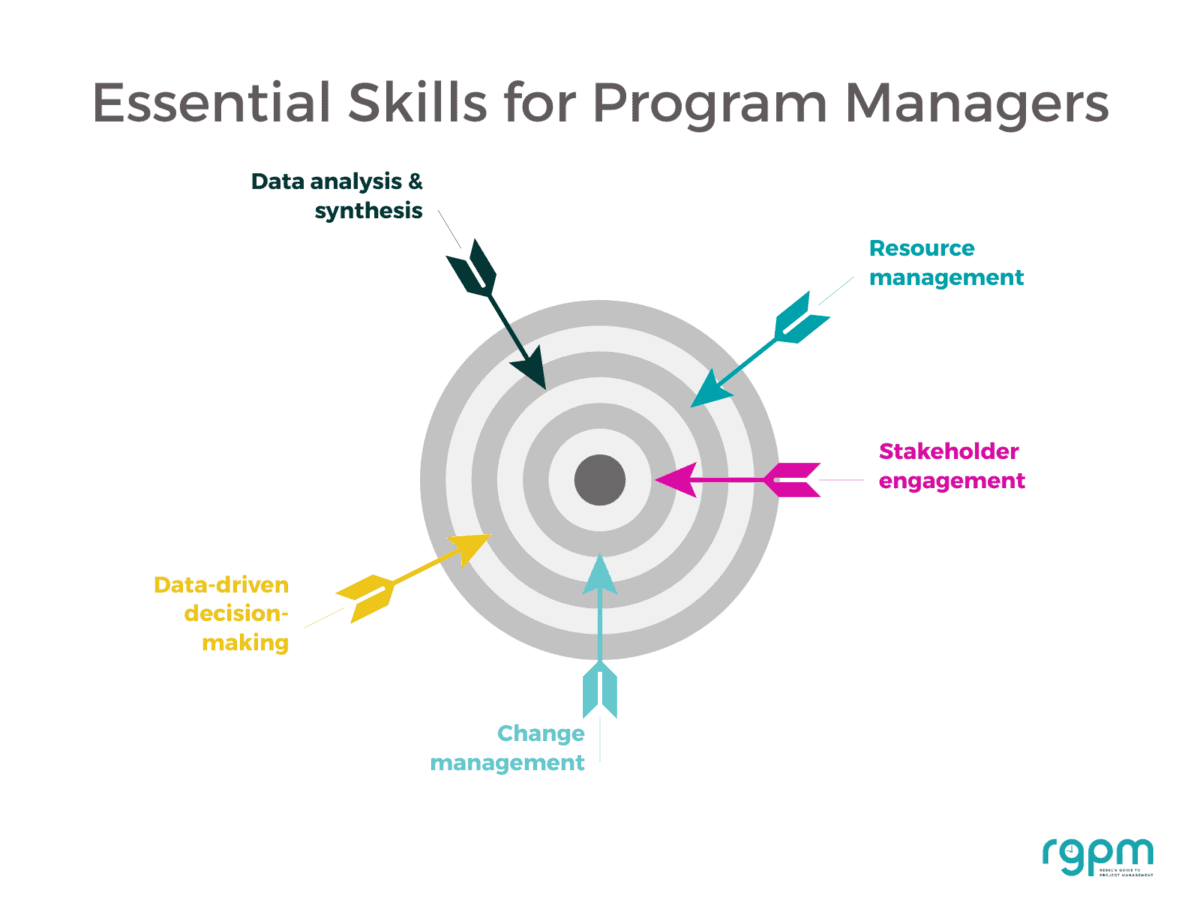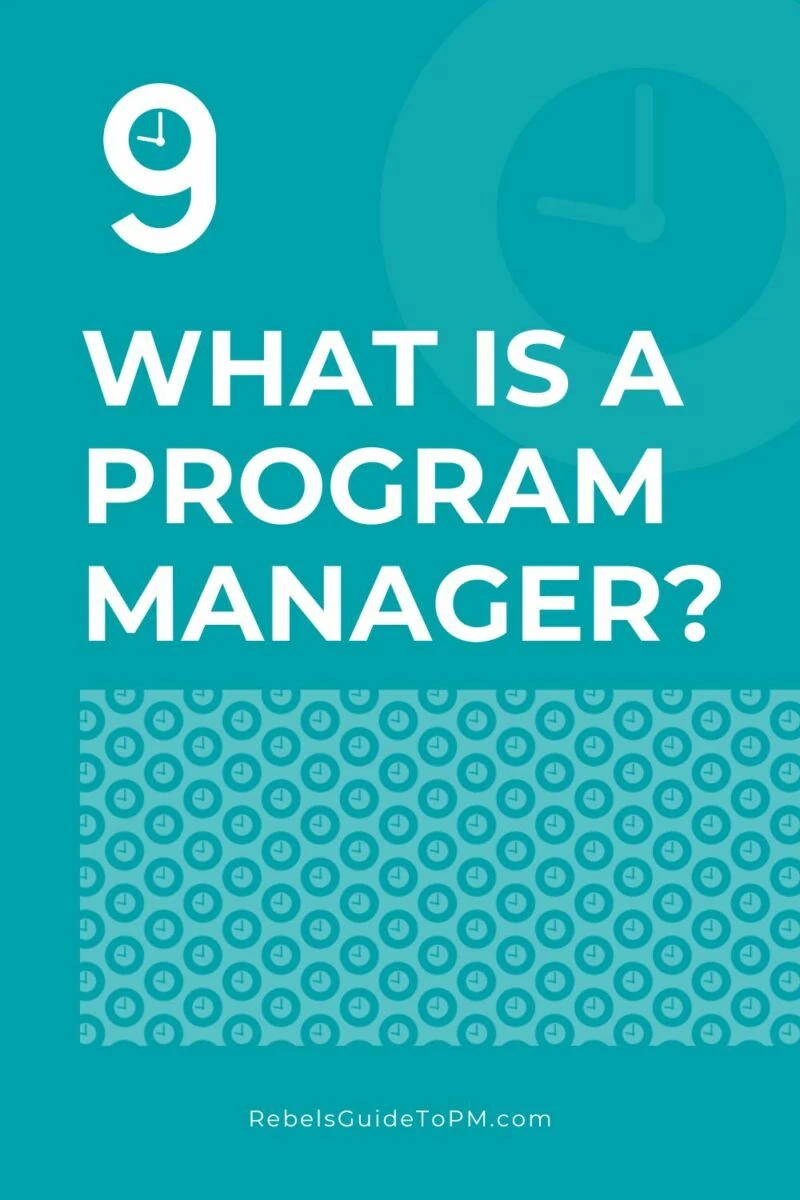What does a Program Manager do? A program manager explains!
A program manager is someone who is responsible for leading a program of change. They coordinate the work of multiple teams managing multiple projects to ensure that overall, the business gets to where it wants to be.
But there’s a bit more to it than that. So what is a program manager?
Having been a program manager, I feel I can share a few insights about what the job is really like and what we’re expected to do. Read on!
First we should start with a definition of program management.
What is a program?
A program is a collection of related individual projects, all with similar aims, objectives and resources that together deliver a common outcome and/or significant change; for example, moving the company to being a paperless office would be a program with a number of projects like:
- Choosing and implementing an electronic document management system for Head Office
- Designing a paperless sales process for use in the company’s shops and implementing it to all branches
- Launching an employee portal for electronic payslips and HR information
- Launching an electronic expense management system with approval workflow
- Developing the digital strategy for future projects to follow
And so on.
Each of these are projects with a project manager, but together they deliver a transformative change for the business.
The overall change is managed as a program, under a program manager who consolidates program-level risks, manages resource conflicts across all projects, controls the budget and works with business owners to realize the benefits across all the initiatives.
Regardless of what type of program it is, programs tend to deliver strategic objectives and organizational change – bigger transformations than individual projects. Because of that, strategic alignment for the work is really important and you should be able to see how your work drives the organization forward.
What is program management?
Program management is the ability to lead a program, keep all the moving parts moving in the right direction and deliver the overall change.
It’s the collection of techniques you use to do the job.
Program management requires a different skill set to project management, but it’s often considered as a future career move for experienced project managers.
What is a program manager?
I’ll say it again:
A program manager is someone who is responsible for leading a program of change. They coordinate the work of multiple teams managing multiple projects to ensure that overall, the business gets to where it wants to be.
I certainly found that some program management skills do overlap with project management skills but the easiest way to think about it is this: a program manager sees things at the next level up from a project manager.
There are multiple projects with interdependent resources, risks, and timelines. There’s a lot more juggling to do. It’s a bigger picture role.
Personally, I always found program management more interesting because it’s more strategic, longer term and it’s easy to see the value.
However, you do have to be able to live with uncertainty and not be too stressed out not knowing the exact detail. There’s a lot of trust involved as the project managers need you to get out of the way so they can manage the detail.
That ability to stay out of the weeds is often what project managers find hard when they make the shift.
Program manager alternative titles: what your job might be called
You might be called something different to a program manager. For example, I’m a Senior Project Manager but I still manage a program. Other alternative job titles for program managers include:
- Program Director (typically a more senior leadership role than a program manager)
- Technical Program Manager
- Program Coordinator or Program Specialist (typically a more junior role than a program manager)
- Program leader
- Program owner
- Program controller
One of the biggest challenges with finding a role is that different organizations use different job titles. Check out the exact job description if you are applying to a new post and ensure the responsibilities align with what you want (and are qualified) to do.
What are a program manager’s responsibilities?
Let’s look at what a program manager does all day. Much of this will be written into your job description.
In this role you’ll work under your own initiative most of the time. You’ll receive broad direction from your leadership team. You are responsible for maintaining the program plan and scheduling work at a relatively high level, and you’ll also assign tasks to other people. These could be project managers or PMO colleagues.
A program manager is responsible for these activities as a program kicks off:
- Defining, facilitating and completing programs, including setting the approach. These will be made up of a number of projects with clear deadlines and direct business impact
- Designing the program organization structure (get an org chart template) and securing the resources to do the work.
And during program delivery, you’ll focus on these activities, while demonstrating your leadership skills:
- Making sure project teams have what they need to get their work done and that there is a flow of communication up and down through the program
- Helping teams select the right project management methodologies for the type of work they are delivering
- Day to day management of the program, including dealing with questions and escalations from project teams
- Identifying, assessing and managing risks that might stop the program being successful
- Ensuring that the related project plans are realistic and up-to-date, in line with the methods used, and that they make it possible to meet deadlines
- Managing dependencies between projects.
Plus you’ll do a range of communication and reporting tasks, much like project managers do, but consolidating information at a higher level to provide an umbrella view to stakeholders (who tend to be more senior and what different information):
- Preparing, circulating and managing program documentation
- Ensuring that there is regular communication with the stakeholders, and that this accurately reflects what is going on
- Regular reporting to key stakeholders and the PMO.
On top of all that, you have a range of governance and accountability responsibilities to maintain:
- Ensuring that quality reviews take place effectively and at the right time
- Managing the change control procedure for the program
- Being responsible for program governance including sitting on the Program Board and program controls
- Preparing a plan for benefits realization and ensuring that it is carried out so the organization receives the planned benefit
- Ensuring that project deliverables are completed within the parameters agreed around budget, resource and schedule, and that deliverables are handed over to users and signed off
A successful program manager does all this, and you’ll probably find yourself mentoring project managers too.
Tired yet? It’s a lot. But it’s not beyond you if this is the path you want to follow in your career.
How many hours do program managers work?
Typically, a program manager works a standard 9am to 5pm working day, Monday to Friday. At least, that’s what I do. Your organization might have longer working days.
You shouldn’t be routinely expected to work weekends or outside of your normal office hours unless there is a particular challenge happening.
For example, around important governance meetings I will often work longer hours to ensure the papers are ready and stakeholders are adequately briefed.
Who does a program manager report to?
Again, every organization is different. If you are a Technical Program Manager (TPM), you might report into a technical division. If you are a business program manager, you might report into the PMO or the portfolio director.
Normally, your line manager would be a senior leader responsible for business change delivery across the organization.

What skills do you need to be a Program Manager?
Program management isn’t the same as managing projects and the skills you need are quite different. However, they are certainly aligned and many project managers successfully make the leap into the more strategic and higher-level role of managing a program of work.
If you want to move into program management, these 5 skills will help you prove you are capable of doing the role:
- Resource management
- Stakeholder engagement
- Data analysis and synthesis
- Data-driven decision making
Change management .
You’ll see these skills on a program manager job description – and if you don’t you should be asking why!

Practical experience as a project manager or operational (line) manager will also help.
1. Resource management
You’ll need to be able to review work allocations across multiple teams and check people are working efficiently – and on the right tasks.
That might mean pulling people off a project to focus on another piece of work. You’ll need a good understanding of what the individual projects are all about so you can make sensible resource choices.
Resource management also involves capacity planning, so you’ll be looking ahead to what skills the program needs in the future and making sure the people on the teams can fill those needs. If they can’t, do a training needs analysis and get your team skilled up.
2. Stakeholder engagement
In my experience, stakeholder engagement at program level is more ‘political’ with a small ‘p’. It’s part of the leadership skills you’ll have to demonstrate in the role.
There are more stakeholders to work with, and they tend to be higher up the organization. They have agendas of their own and are connected to strategy in ways you might not realize.
There have been a few times where I’ve been in the room with board members and they’ve said something that I had been totally unaware of – something that was a driving force behind shaping strategy within the company and the industry more broadly.
You’ve got to use business acumen and deal with the bigger picture on a much larger scale and the influences that puts on your stakeholder community.
3. Data analysis and synthesis
Data analysis is going to be significant for the future of project management. There are multiple data sources at program level and you have to look at them all, focusing in on what is really important.
It’s essential to be able to assimilate lots of information and condense it into a format that people can understand. You need to be able to tell the story of your program in a single slide, all the while focusing on what people want to know and need to know.
4. Data-driven decision making
You have to make decisions for the good of the program. That means relying on facts to work out what to do, not emotions.
You need the confidence to stand behind your decision and instruct people on what you’ve decided.
Basically, decision-making at this level requires more exposure because there are greater implications for when things go wrong. Honesty and transparency become more important in how you reached a decision.
5. Change management
In the ‘old’ way of thinking, projects deliver outputs and programs deliver outcomes. I’ve always had a bit of an issue with that approach, but let’s not go there now.
Change management on programs is about making sure that the outputs from projects are integrated into the business and used. It’s important to make sure the end result is adopted (and, ideally, loved by users).
Being able to change behavior at an organizational level is key to being good at managing programs. People have to understand what the program is all about, how all the component projects contribute to the bigger picture and what role they help play in delivering this part of the strategy. (Because programs should in 99.9% of cases deliver strategy.)
What’s the career path for a program manager?
After spending some time managing projects of some complexity, you’ll be thinking about the next phase of your career. Program management roles are often seen as a natural choice for project managers looking for their next challenge.
As businesses get more strategic with project management and start aligning projects together into programs of work, the need for skilled program managers grows.
You might start asking yourself how to become a program manager because of the need from your company, in which case, you can simply go ahead and pitch that role to your management team.
(Make sure the proposal also includes the need to recruit a project manager to replace you.)
However, you could move into program management from a senior operational role or another PMO role as well.
Program management in the organization
Managing a program should be considered a senior, influential, leadership role. It requires a wide range of interpersonal skills, experience and a fair bit of courage to be able to stand up, take the decisions, and lead organizational change at that level.
However, it’s a hugely rewarding job. When you see what’s being delivered through the individual projects and the benefits realization starts, you’ll appreciate what a mammoth effort you and other team members have made to make that happen.
Being able to juggle interconnected projects is truly a skill. It’s the way strategy gets delivered and it’s a role that supports colleagues across the organization because you put the plans in place to make their goals a reality.
FAQ
-
Is being a program manager hard?
The technical skills are straightforward. The challenge with being a program manager comes in juggling the multiple stakeholder expectations and senior level politics within the organization.
-
Is being a program manager a good career?
Yes, program managers are well-paid with good career prospects. It’s a respected and interesting job, so it is a good option for individuals wanting to move on from project management.
-
Do program managers code?
No, typically a program manager would not create code, they would be a leading projects. The coders/developers would sit in the project teams carrying out the work to get the software live.
-
Where do program managers work?
Program managers work in all industries, typically in larger organizations where there is a mature project and program structure.
This is an edited extract from my book, Project Manager (BCS Books).
Pin for later reading

